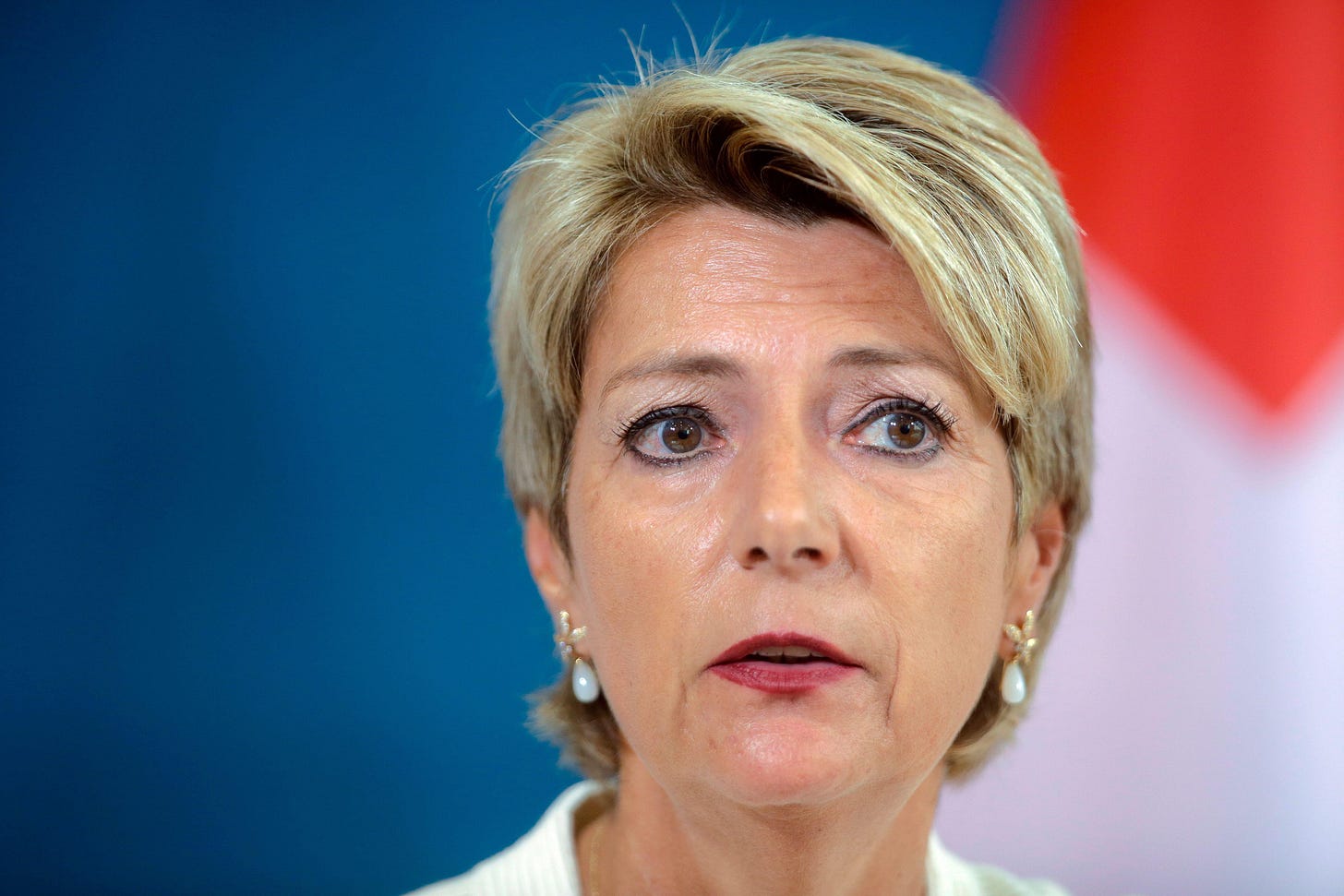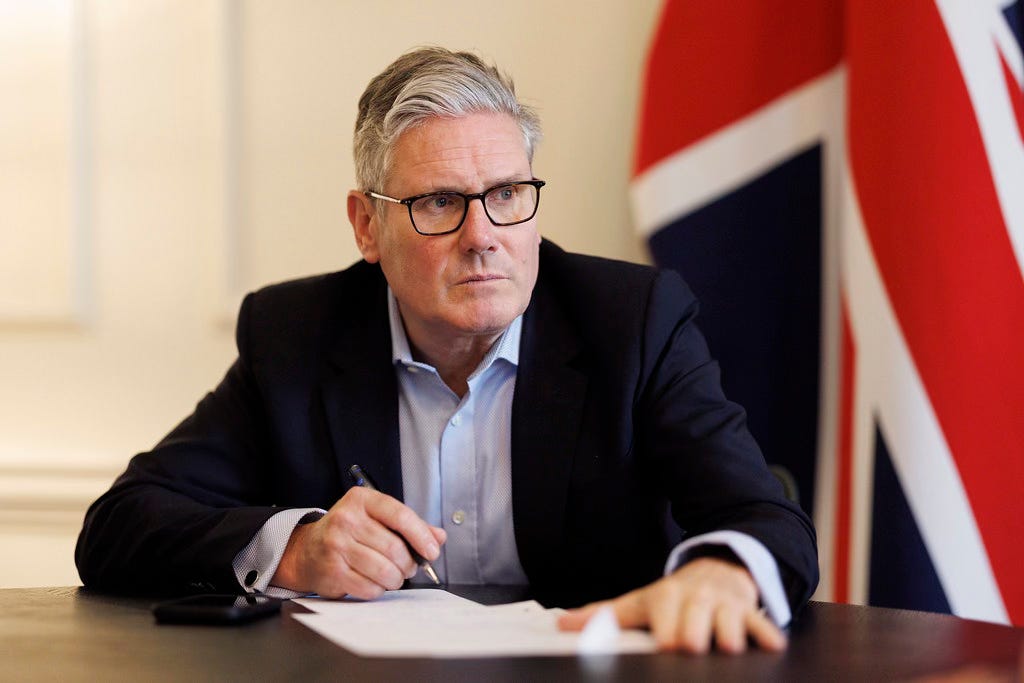
Switzerland’s stunned leader is heading to Washington today to avert an economic crisis after the wealthy alpine nation emerged as one of the biggest losers of Trump’s erratic trade war.
President Karin Keller-Sutter and her delegation insist they are “ready to present a more attractive offer” to US officials. They are scrambling to negotiate better trade terms after Donald Trump hit Switzerland with a shock 39% tariff rate on 1 August. An announcement that, just to add insult to injury, came as the entire country was out celebrating Swiss National Day.
Aside from being the most punishing rate in Europe, even worldwide, it is topped only by the steep tariffs Trump has imposed on Syria, Laos, Myanmar and Brazil.
This is a major blow for Bern which considers Washington its largest market for luxury watches, jewellery, chocolate, machinery and pharmaceuticals. Swiss companies’ exports to America account for around one-sixth of their total foreign sales.
A 39 per cent tariff would have a huge impact on Switzerland’s export-oriented economy and could spark a recession, especially if Washington applies this rate to pharmaceuticals too (at the moment, Trump is still mulling over his desired import taxes for the global pharma industry).
The slight from America has been politically damaging for President Keller-Sutter, who stands accused of fumbling a vital phone call with Donald Trump, just prior to his shock announcement. Swiss newspaper 24 heures has labelled it “the heaviest defeat of her political career”.
The Swiss were caught unaware, with national media reporting that negotiators were confident they had secured a 10 per cent tariff on exports to the US.
Instead, the US president opted to hit them with an even higher rate than the 31 per cent he announced on “Liberation Day” back in April. And far higher than the EU’s 15 per cent and Britain’s 10 per cent rate.
Switzerland, often labelled Europe’s “most stubbornly independent country” lies in contrast to Britain in that the nimbleness that comes with not being part of the bloc has done little to secure it more favourable trade terms with the US.
Now, Keller-Sutter is desperate to negotiate a better deal. Yet she has also argued that there are limited concessions she can offer given the extremely favourable trade terms that Washington already enjoys with Bern.
She’s not wrong. Keller-Sutter could hardly open the Swiss market up to American goods any further: Switzerland unilaterally abolished all customs duties on industrial goods on 1 January 2024, allowing more than 99% of US goods to enter the Swiss market without any duties. And multiple Swiss companies have already heavily invested in the US, making the small Alpine nation the sixth largest foreign investor in America and the leading investor in research and development.
This begs the question: what exactly has Bern done to be hit with quite such a punishing rate?
While it is not, unlike say India, being punished for its protectionism, this harsh treatment appears to stem from Donald Trump’s obsession with trade deficits.
In an interview with CNBC, Trump alluded to his phone call with Keller-Sutter. “The woman was nice, but she didn’t want to listen”, he told reporters, adding that he had told the Swiss leader: “We have a $41 billion deficit with you, Madame … and you want to pay 1% tariffs.”
It’s not immediately clear where Trump’s $41 billion figure comes from. According to the US Census Bureau, Washington ran a $38.3 billion trade imbalance on goods last year with Switzerland.
Regardless, that is $38.3 billion too much for a deficit-obsessed American president, who seems to think that any surplus with the US amounts to “stealing money” from Americans.
It’s worth adding that, even taking this trade deficit into account, the extent of Trump’s punishing rate on Switzerland remains a little puzzling. After all, America’s deficit with Japan and South Korea run considerably higher at $70bn and $56bn respectively.
There is also a curious irony to all of this. Switzerland’s outsized trade surplus with America has only widened under Trump. And indeed largely thanks to Trump.
In the first quarter of 2025 alone, Switzerland’s trade surplus with America ballooned to a whopping $54bn. As Trump’s erratic policies created a period of heightened economic uncertainty, American investors increasingly sought safety in one of Switzerland’s main exports: gold.
Caitlin Allen
Deputy Editor
Adam Boulton
The divisiveness of “centrist” Starmer

READ HERE
Israel expected to propose full Gaza occupation – According to Israeli media, Benjamin Netanyahu is expected to announce plans to fully re-occupy the Gaza Strip, despite some opposition from key military chiefs. Families of Israeli hostages have also objected, arguing that this has more chance of harming their loved ones. Many of Israel’s close allies are also likely to condemn such a move on the basis that it will further alleviate the suffering of Palestinian civilians inside Gaza.
Arrests made in Taiwan over chip technology leak – Six people have been arrested in Taiwan after being accused of stealing trade secrets from Taiwan Semiconductor Manufacturing Co., the chipmaker to Nvidia Corp. This has prompted an investigation into a breach of national security, and establishing whether data has been leaked to other parties.
Reports of virus in China prompting Covid-style measures – China’s Guangdong province has reported more than 7,000 cases of chikungunya, a mosquito-borne virus, since July, prompting lockdown-style measures for sufferers. The virus is spread through the bite of a mosquito, with symptoms including a fever and severe joint pains.
Nuclear reactor to be put on the moon – Nasa are planning to put a nuclear reactor on the moon by 2030, as part of planning for future permanent living for humans. This comes at a time where countries such as Russia, China, India and Japan have all announced ambitions plans for exploration of the lunar surface.
-
What the next round of US sanctions against Russia should look like. Nicholas Fenton and Maria Snegovaya in Foreign Policy.
-
PR is no longer unthinkable, says Tom Clark in Prospect.
-
Jeffrey H. Michaels in Engelsberg Ideas on the Cold War origins of Trump’s rift with Europe.
-
The dark roots of the University of Edinburgh racism review. Sebastian Milbank in The Critic.
-
The Economist: On Ukraine’s front lines the kill zone is getting deeper.
